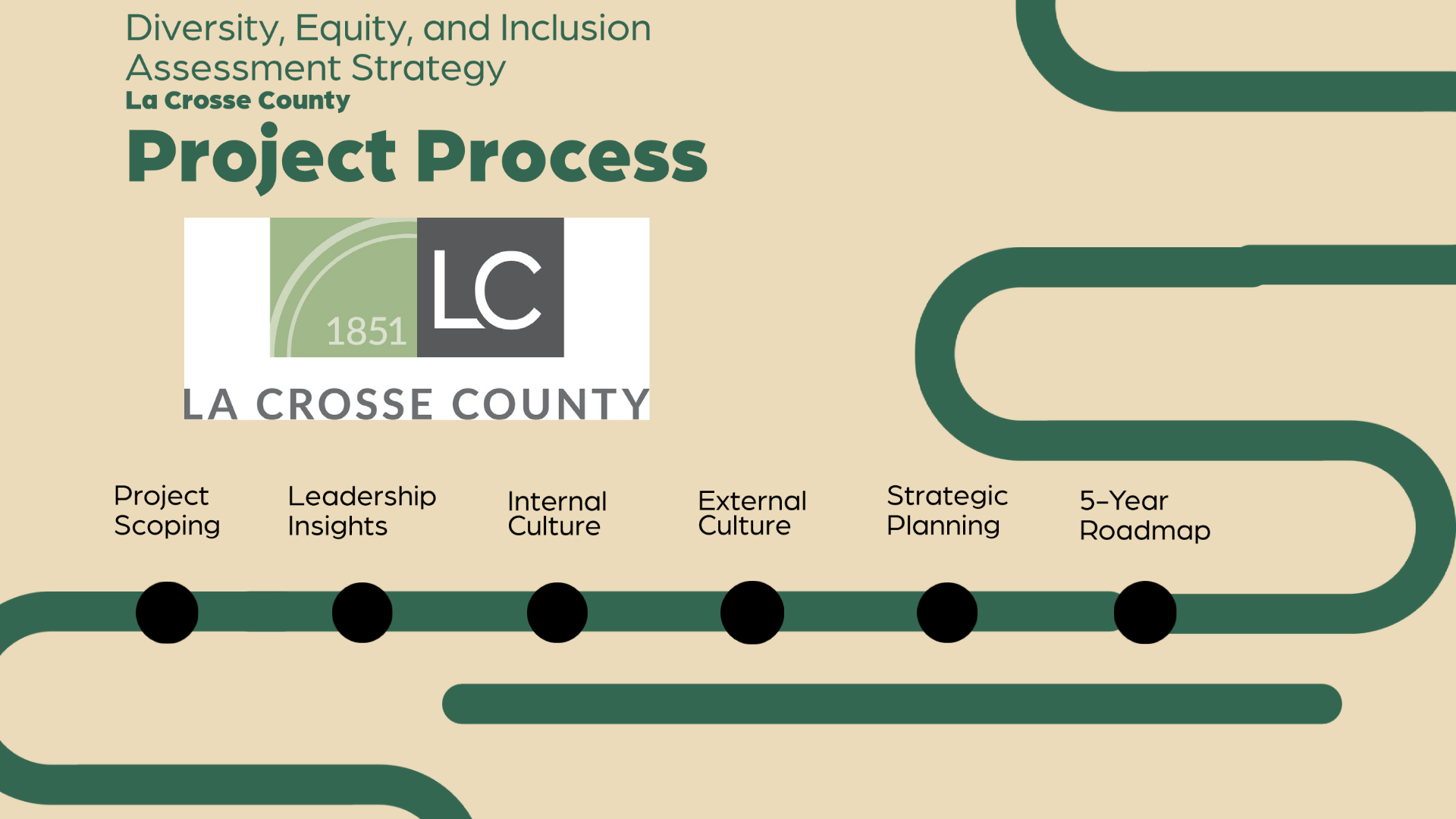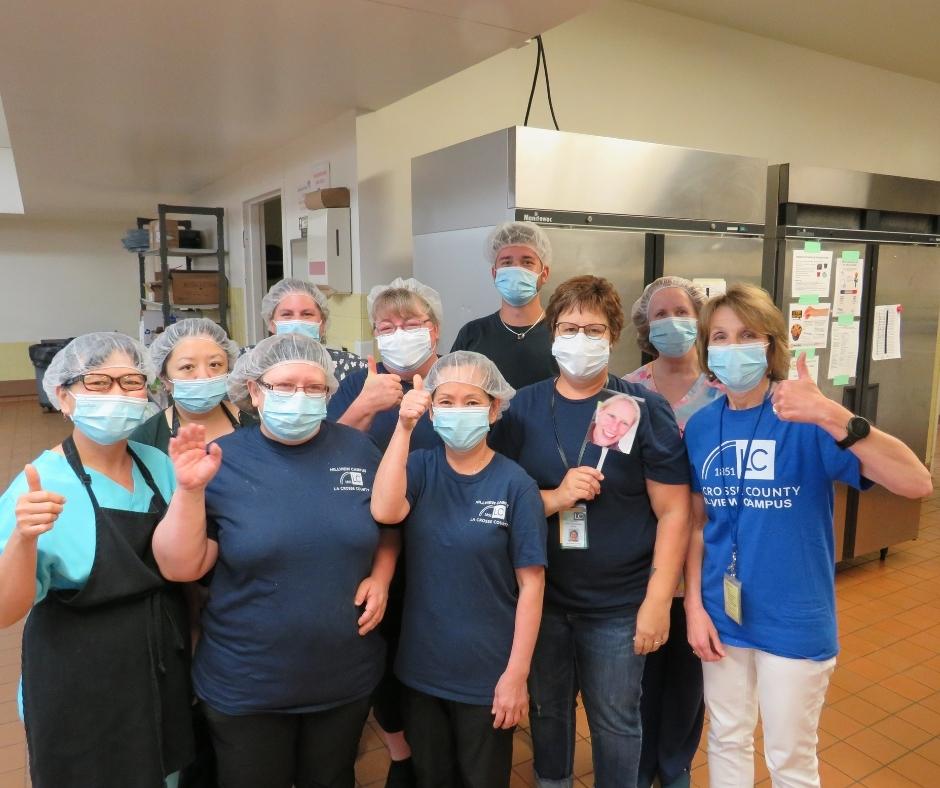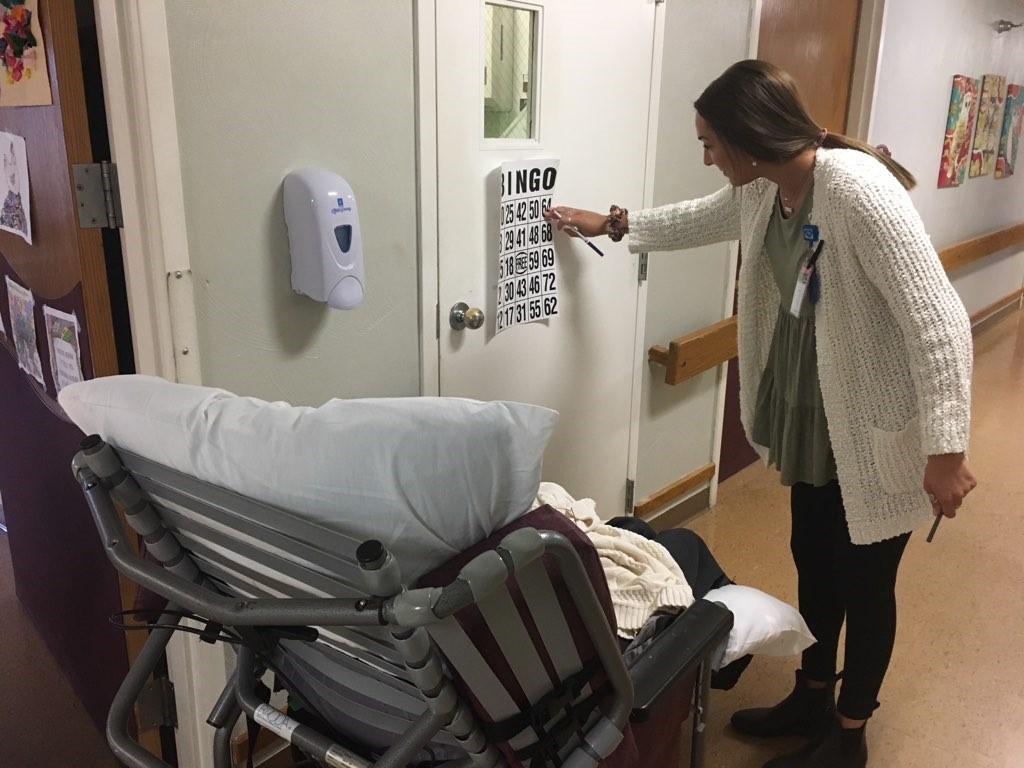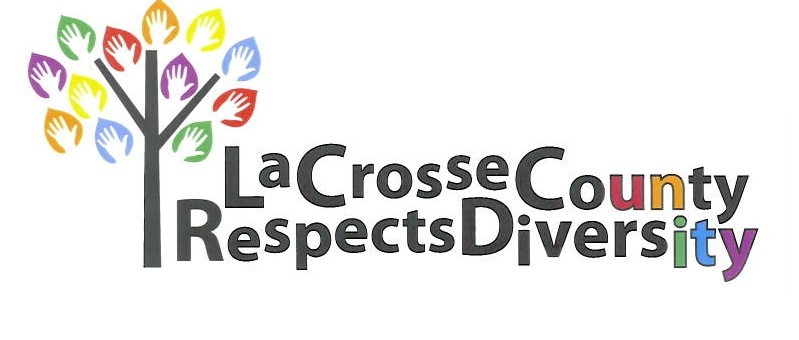
Important Links

La Crosse County Diversity, Equity, and Inclusion Assessment Strategy
La Crosse County recognizes the importance of promoting diversity, equity, and inclusion (DEIB) within its organization and has taken the proactive step of conducting a DEIB assessment. The assessment will provide a comprehensive analysis of the organization's current DEIB practices, policies, and culture, as well as the experiences and perspectives of its employees and community members. By conducting this assessment, La Crosse County aims to identify areas of strength, as well as areas where improvement is needed, and to develop a targeted strategy for advancing DEIB within both the community and organization.
Through this assessment, La Crosse County hopes to create a more inclusive workplace culture that values diversity and promotes equity for all employees and learn from the community what is required so that everyone may experience improved outcomes through their daily lives. The assessment will provide an opportunity for employees and community members to share their perspectives and experiences related to DEIB and to participate in the development of a DEIB strategy that reflects the needs and priorities of the County. Ultimately, the goal of the assessment is to create a more welcoming, respectful, and supportive organization that fosters collaboration, innovation, and excellence.
By conducting this assessment, La Crosse County is demonstrating its commitment to DEIB and to building a culture that reflects the diversity of its community and their needs. The assessment will provide a roadmap for future DEIB efforts and help to ensure that La Crosse County is able to attract and retain the best talent, build strong external partnerships, and achieve its mission of providing high-quality services to the community.
What follows are the phases involved in the project process:
Scoping: The scoping phase of the project is a crucial initial stage where the boundaries, objectives, requirements, and deliverables are defined and documented.
This stage helps establish a clear understanding of the project's purpose, scope, and limitations among all La Crosse County stakeholders. By identifying and analyzing the needs, resources, and constraints, the scoping phase aids in creating a solid foundation for subsequent planning, execution, and control, ultimately increasing the likelihood of a successful project outcome.
Leadership Insights: The purpose of conducting leadership insights interviews as part of a needs assessment is to gain valuable information and insights from key stakeholders and leaders within La Crosse County about the current leadership strengths, weaknesses, and needs.
Through these 1-on-1 interviews, the County can identify areas where leadership development is needed and develop a plan to address those needs. The insights gained from the interviews can also help to identify the leadership competencies that are most critical for the County’s success, as well as the specific behaviors and actions that are needed to develop those competencies. Additionally, leadership insights interviews can help to build trust and engagement among both leaders and the community, as they provide an opportunity for the County Management Team and County Board Supervisors to share their perspectives and feel heard. This can ultimately lead to a more positive and collaborative organizational culture. Overall, leadership insights interviews are a valuable tool for seeking to improve leadership capabilities and enhance their overall effectiveness.
Internal Culture: During the internal culture assessment of a diversity, equity, and inclusion (DEIB) needs assessment, several key activities occur:
- Data gathering - The first step in an internal culture assessment is often to gather data on the County's current culture, practices, and policies related to diversity, equity, and inclusion. This will involve reviewing existing policies, procedures, and training materials, as well as conducting surveys, focus groups, and interviews with employees and managers.
- Analysis: Once the data has been collected, it is analyzed to identify patterns, trends, and areas of strength and weakness related to DEIB.
- Findings and recommendations: Based on the analysis of the data, a report will be presented that summarizes the findings and provides recommendations for improving the County's DEIB culture. The report will include specific recommendations of actions that will help improve the internal workplace culture.
- Communication and feedback: The findings and recommendations of the internal culture assessment will communicated to the County Board, senior leaders, managers, and employees. Feedback will be solicited to ensure that the recommendations are aligned with the County's goals and culture.
Overall, the internal culture assessment is a critical component of a DEIB needs assessment, as it provides a baseline understanding of La Crosse County's current DEIB culture and identifies areas for improvement. By conducting an internal culture assessment, we can work to develop a targeted strategy for improving DEIB and creating a more inclusive workplace.
External Culture: During an external culture assessment of a diversity, equity, and inclusion (DEIB) needs assessment that is community-based, several activities occur to gather information and insights from La Crosse County community members. These activities will include:
- Identifying key stakeholders: The first step in an external culture assessment is often to identify key stakeholders who are impacted by the County’s efforts. This may include community organizations, advocacy groups, residents, business, schools, and other entities that have a vested interest in the organization's DEIB practices. Every member of the community is invited to participate in the external culture assessment process.
- Gathering data: County DEIB Culture Survey and Listening Session. A survey is conducted across the La Crosse County community where data is gathered on their perceptions of the County's DEIB culture and practices. This phase will also involve focus groups, and interviews with community stakeholders, as well as review of publicly available data and reports.
- Analysis: The data collected during the external culture assessment is analyzed to identify patterns, trends, and areas of strength and weakness related to the County's DEIB efforts from an external perspective.
- Findings and recommendations: Based on the analysis of the data, a report will be generated that summarizes the findings and provides recommendations for improving the County's DEIB practices from an external perspective. The report will include specific recommendations of actions that will help improve the external County culture.
- Communication and feedback: The findings and recommendations of the external culture assessment will be communicated to the County Board, the La Crosse County community, senior leaders, managers, employees and all those who participated in the assessment. Feedback will be solicited to ensure that the recommendations are aligned with the needs and perspectives of the La Crosse County community.
Overall, the external culture assessment is a critical component of a community-based DEIB needs assessment, as it provides important insights into the County's DEIB practices from an external perspective. By conducting an external culture assessment, the County can identify areas for improvement and develop a targeted strategy for improving DEIB and building stronger relationships with external community stakeholders.
Strategic Planning: The strategic planning process is a systematic and iterative process that organizations use to define their long-term goals and objectives and develop a plan for achieving them. The process involves the following steps:
- Vision and Mission: La Crosse County will define and align the project goals to its vision and mission, which describe the desired future state of the County and its core purpose and values.
- Situational Analysis: The County conducts a situational analysis, which includes an assessment of its internal strengths and weaknesses, as well as external opportunities and threats. This analysis helps the organization to understand its current position and identify areas for improvement.
- Goals and Objectives: Based on the situational analysis, the County can then develop specific, measurable, achievable, relevant, and time-bound (SMART) goals and objectives that align with its mission and vision.
- Strategies and Actions: The County will identify specific tasks, strategies, and actions for achieving its goals and objectives. This may include identifying new policies, processes, plans or services, developing partnerships or collaborations, investing in new technology, or making organizational changes.
- Implementation: The County will implement its DEIB strategic plan by assigning responsibility for specific actions and tasks, setting timelines and milestones, and establishing performance metrics to track progress.
- Monitoring and Evaluation: The County will continuously monitor and evaluate its progress toward achieving its DEIB goals and objectives, and make adjustments to the plan as needed based on changing circumstances or new information.
Overall, the strategic planning process is a critical tool for organizations seeking to achieve their long-term goals and objectives. By engaging in a structured and comprehensive planning process, La Crosse County can align their resources and activities with their mission and vision, and develop a roadmap for achieving success.
5-Year Roadmap: The 5-year roadmap is a valuable tool for the County in promoting diversity, equity, and inclusion (DEIB). The purpose of having a 5-year roadmap as part of DEIB planning is to provide a clear, actionable plan for achieving the County's DEIB goals and objectives over the next five years.
Key goals of a 5-year roadmap for DEIB planning:
- Provides a clear vision: A 5-year roadmap provides a clear vision of where the County wants to be in terms of DEIB in five years. This can help to align the organization's efforts and resources around a common goal and provide a sense of direction and purpose.
- Identifies specific goals and objectives: The 5-year roadmap breaks down the County's DEIB goals and objectives into specific, measurable targets that can be tracked and monitored over time. This helps to ensure that progress is being made and allows the organization to make adjustments as needed.
- Establishes a timeline: The 5-year roadmap establishes a timeline for achieving the County's DEIB goals and objectives. This helps to create a sense of urgency and accountability, and ensures that the organization is making progress toward its goals on a regular basis.
- Aligns with other strategic planning efforts: The 5-year roadmap for DEIB planning is integrated with other strategic planning efforts within the County. This helps to ensure that DEIB goals are aligned with other organizational goals and that resources are being allocated effectively.
Overall, having a 5-year roadmap as part of DEIB planning is a critical tool for operationalizing La Crosse County’s commitment to creating a more diverse, equitable, and inclusive workplace and community. It helps to provide a clear vision, establish specific goals and objectives, create a timeline for achieving those goals, and ensure that DEIB efforts are aligned with other organizational priorities.
How You Can Participate
Our comprehensive approach to this initiative will involve broad engagement with community members, elected officials, and partner organizations. Watch for opportunities to have your voice heard, which will be promoted on this page, through local media, and on the county’s social media channels.









